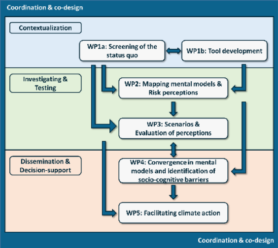About
MECCA is a consortium of social and natural scientists and a wide network of local stakeholders in West and East Africa. The consortium is made up of researchers from the University of Bergen, Utrecht University, the Potsdam Institute for Climate Impact Research and is coordinated by the Copernicus Institute of Sustainable Development at Utrecht University.
Co-development of pathways to effectively facilitate climate action
We join forces to co-develop pathways to effectively facilitate climate action, to achieve the long-term objectives of the Paris Agreement, contribute to Sustainable Development Goal 13 (among others), and inform the nationally determined contributions strategies.
Climate change has distinctive implications for Africa. For Africa’s people, climate change is not an abstract phenomenon but a concrete reality that impacts key aspects of everyday life. The combination of a vulnerable climate system, widespread poverty and low adaptive capacities has created a high risk of exposure to adverse climatic impacts among African communities. These impacts are already being felt across the continent through rising temperatures, growing pressure from pests and diseases, declining agricultural productivity and the increasing frequency of extreme weather events.

Bridging gaps in public perceptions of climate change
Particularly important issues are bridging the gaps in public perceptions of climate change, with a view to widening shared recognition of the need for coordinated responses, providing incentives for action, and building local capacities for mitigation and adaptation. Here, a crucial component is the communication of natural science-based knowledge on climate change and its translation into comprehensible and tailor-made information for the audiences, the interface between science and the non-scientific world.
Two African case studies
MECCA tackles these issues across two African case studies: Lake Victoria in the East and Lagos, a coastal megacity, in the West. These regions have been selected due to their high vulnerability to climate change impacts. Moreover, the regions span large populations, but lack the resources to devote sufficient research attention to investigate mitigation and adaptation strategies. The consortium’s ample field experience in these regions and broad networks among key decision-makers, make these ideal case studies for the research project.

